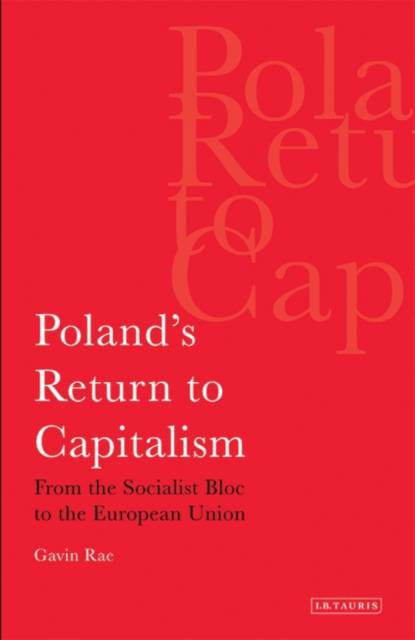
- Retrait gratuit dans votre magasin Club
- 7.000.000 titres dans notre catalogue
- Payer en toute sécurité
- Toujours un magasin près de chez vous
- Retrait gratuit dans votre magasin Club
- 7.000.0000 titres dans notre catalogue
- Payer en toute sécurité
- Toujours un magasin près de chez vous
Poland's Return to Capitalism From the Socialist Bloc to the European Union
From the Socialist Bloc to the European Union
Gavin Rae
Livre broché | Anglais
72,95 €
+ 145 points
Description
This book considers the social, economic and political consequences of Poland's transition from socialism to capitalism. The immense changes that have occurred in the country over the past decade and a half are analysed in their historical and geo-political framework. Poland was the first Eastern European country to return to capitalism, with its shock-therapy economic reforms replicated throughout the region. These sought to dismantle the socialist elements of the economy as rapidly as possible and open up the post-socialist countries to the world capitalist market. The former socialist countries were absorbed into the international division of labour and their economies quickly became a part of and dependent upon the global capitalist system. The revolutions of 1989-91 not only transformed Eastern Europe but instigated fundamental changes to the international capitalist system itself. By opening up the ex-socialist economies to international capital a new era of globalisation was opened, as the principles and practices of neo-liberalism gained ascendancy.
While a section of society prospered from this opening, other social groups saw their living-standards decline, creating large social inequalities. One consequence of these social divisions has been the destabilising of the newly created democratic political systems. The growth of more authoritarian, conservative political currents in Poland is an example of this. As the largest and most strategically important country in Central-Eastern Europe, Poland has increasingly become a focus of international relations between the major powers. Events in Poland, especially after European expansion, influence relations between the USA, the European Union and Russia. This book therefore looks both at how the absorption of Poland into the international capitalist system has transformed the country and at how this process is contributing to developments globally. It finishes by considering developments since EU Accession and at the expected results of this expansion both within Poland and an enlarged EU.
While a section of society prospered from this opening, other social groups saw their living-standards decline, creating large social inequalities. One consequence of these social divisions has been the destabilising of the newly created democratic political systems. The growth of more authoritarian, conservative political currents in Poland is an example of this. As the largest and most strategically important country in Central-Eastern Europe, Poland has increasingly become a focus of international relations between the major powers. Events in Poland, especially after European expansion, influence relations between the USA, the European Union and Russia. This book therefore looks both at how the absorption of Poland into the international capitalist system has transformed the country and at how this process is contributing to developments globally. It finishes by considering developments since EU Accession and at the expected results of this expansion both within Poland and an enlarged EU.
Spécifications
Parties prenantes
- Auteur(s) :
- Editeur:
Contenu
- Nombre de pages :
- 248
- Langue:
- Anglais
Caractéristiques
- EAN:
- 9781780760391
- Date de parution :
- 30-10-12
- Format:
- Livre broché
- Format numérique:
- Trade paperback (VS)
- Dimensions :
- 137 mm x 213 mm
- Poids :
- 249 g

Les avis
Nous publions uniquement les avis qui respectent les conditions requises. Consultez nos conditions pour les avis.






